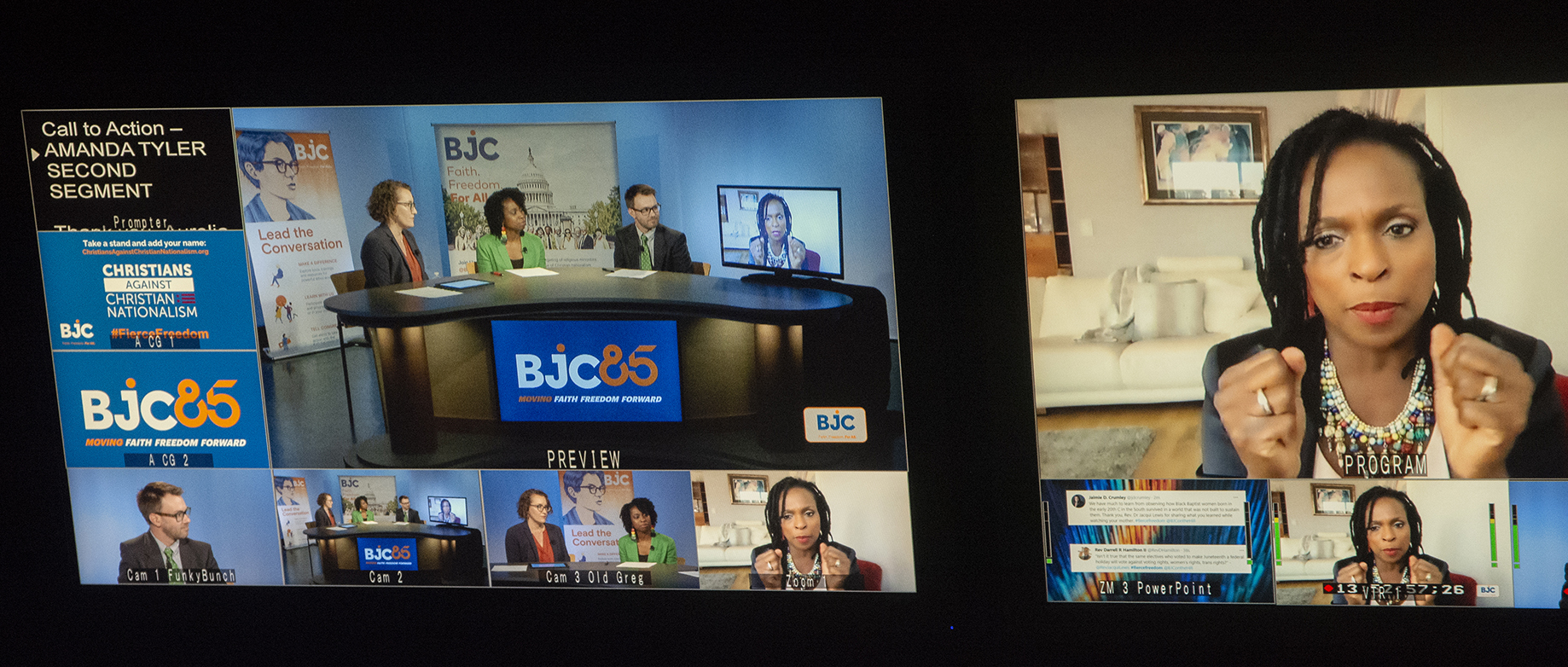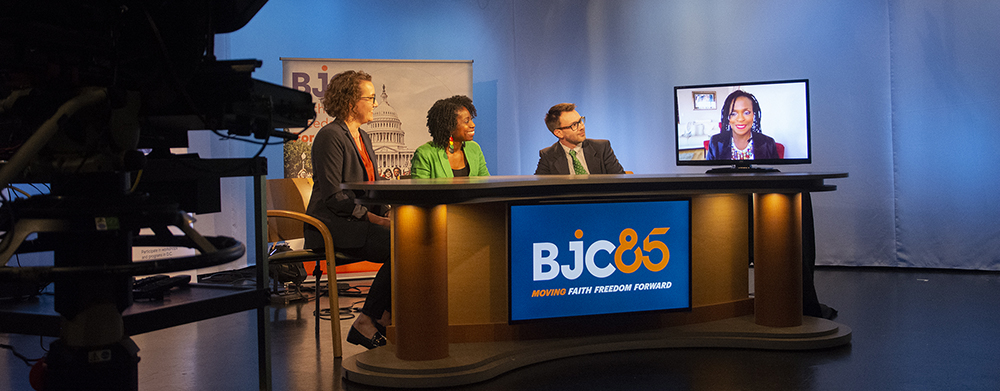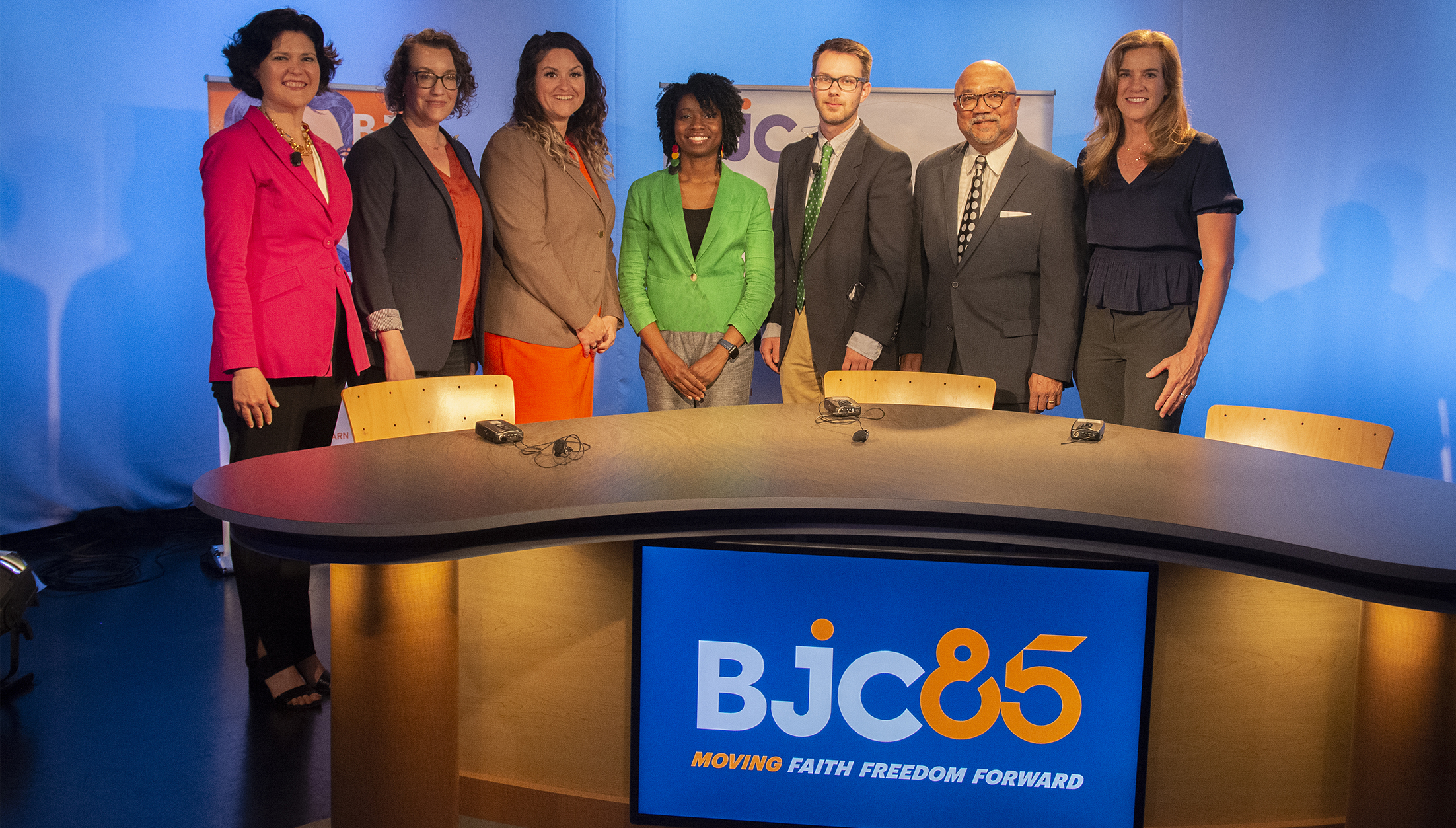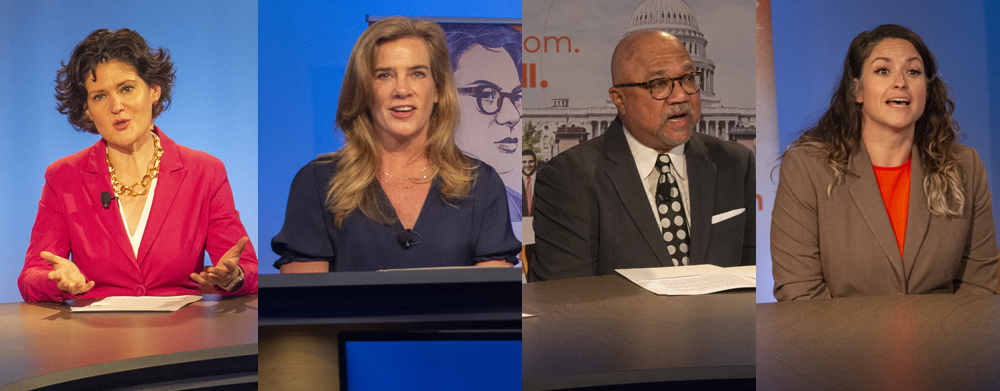A fierce call to freedom: Dismantle racism
Rev. Dr. Jacqui Lewis asks us to imagine a world with new essential ways of doing church

Fierce freedom, according to the Rev. Dr. Jacqui Lewis, is the freedom to use our faith and our politics “to create on earth as it is in heaven the reign of God,” a vision that includes wholeness for all and a disruption of white supremacy.
Dr. Lewis provided this view during “Fierce Freedom,” a live event hosted by BJC on June 18. Broadcasting from the studios of the National Press Club in Washington, D.C., the program brought together religious liberty supporters from across the country to hear from Lewis and members of the BJC community.
An author, activist and public theologian, Lewis serves as the Senior Minister of Middle Collegiate Church in New York City — a 1,400-member multiracial, welcoming and inclusive congregation.
Lewis shared her personal experiences and called out those who treat Black grief as a threat and white rage as a sacrament.
The event took place the week the United States declared Juneteenth a national holiday, and Lewis pointed out that the symbolism of doing so doesn’t take away the struggles our country faces. Noting that rates of Black incarceration, mortality and poverty eclipse white numbers by large margins, she said those who voted for the holiday will often still vote against changing policies to respect the rights of others, which undercuts freedom.
“Not any of us is free, as long as Black folks are not free. The sad thing about white supremacy is that it actually shackles all of us. To fear. To inequality. To shame. To injustice. White rage is what put the knee on George Floyd’s neck. White rage is what puts white supremacy on the necks of all people of color,” she said.
Lewis noted that in the immediate aftermath of the January 6 insurrection at the U.S. Capitol, both conservative and progressive commentators said “this is not who we are.” Lewis said that’s not true.
“It is precisely who we are. We are a nation built on violence. We are a nation built on stolen land by stolen bodies. We are a nation in which racism is so woven in the fabric of our democracy, it’s hard to pull them apart,” she said.
Lewis also lamented the way progressive Christianity and conservative Christianity are often pitted against each other but not allied on disrupting racism.
“I’m grieving as a Black person how many white clergy colleagues say sincerely that they don’t believe Jesus was for justice,” she said, noting that Jesus was political himself in feeding people on the mountainside, healing the sick, centering women and children in his culture and offering health care to the lepers and the blind and the lame.

“Fierce freedom is to follow in the way of the Afro-Semitic pobrecito — the poor one — born in Bethlehem where the cows eat, raised in Nazareth — which is Palestine — where ‘nothing good comes from,’” she said, noting that Jesus was an outsider to the empire and was both homeless and a refugee at different points in his life.
“To follow in the way of that one is to follow in the narrow place — through the narrow place, through the eye of the needle, through the gate — that slogs off for us any sense of privilege and power, except the kind that comes from being last. Except the kind that comes from standing in solidarity with the people who Jesus stood in solidarity with: the outsiders, the disenfranchised, the tax collectors, the women, the sinners,” she said.
“True religious freedom — fierce freedom — is the freedom to speak that kind of truth to power,” Lewis said. She noted that some of what the church has constructed looks more like the institutions church people are called to critique than the loving institutions Jesus would create.
“I’m dreaming of freedom to imagine that we are the ones we’ve been waiting for — we’re the ones to write a new story together. That we disrupt anti-Semitism because Jesus was a Jew. That we disrupt anti-Islamic sentiment because God speaks more than one language. That we disrupt racism because God is on the side of all of us — including Black lives. That God sent a mixed race brown Black person in flesh in the world to teach the world about love.”
Lewis asked viewers to consider what would happen if they made those ideals an essential way of doing church.
“What happens if we grow fierce courage so that telling the story of anti-racism from our pulpits and in our classrooms and in our small groups is rewarded by increase in pay and increase in offering and growth of church?” she asked.
“Don’t you want our children to think it’s just normal stuff as Christians to dismantle racism everywhere we see it? That’s what I think fierce freedom looks like: the freedom to — in our lives of faith — put faith and politics together to create on earth as it is in heaven the reign of God, in which everyone is loved, everyone is well, everyone is whole, everyone has enough, all bodies matter, and in which the matter of Black lives becomes such a priority that it disrupts white supremacy — all of its tentacles. And all of us, thereby, are more free.”
After her presentation, Lewis joined a panel discussion for further conversation with the Rev. Robin Anderson, co-pastor of Commonwealth Baptist Church in Alexandria, Virginia; the Rev. Keisha I. Patrick, a 2019 BJC Fellow; and Dr. Andrew Gardner, a BJC Board member who is a visiting faculty associate in American Religious History at Hartford Seminary.
Gardner noted that Lewis’ presentation was a powerful reminder to BJC supporters and congregations about the need to combine faith with taking action.
“So many of BJC’s supporting congregations are white and have had the option to put faith and politics together when it’s convenient and keep faith and politics apart when it’s inconvenient,” he said, reminding viewers that faith is always political as Lewis illustrated.
“As a pastor, what struck me so much was this beautiful image of what could happen if churches would disrupt theology that crushes souls,” Anderson said.
Patrick noted that Lewis’ whole message beckons a viewer to take a look at Luke 4 when Jesus announced his mission.
“If we think about justice, we cannot say that Jesus wasn’t about justice because Jesus stood in the synagogue and he said that he was there to preach the gospel to the poor, to heal the brokenhearted, to preach liberty to the captives, recovery of sight to the blind and to set at liberty those who are oppressed,” she said.
Patrick also noted Lewis’ focus on freedom and the idea that nobody is free until Black people are free.
“In this country, Black folks have always been at the bottom,” Patrick said. “When other ethnic groups have come and been able to assimilate, we have not. And, so no one is free still until Black people are free, and I’ll say until Black women are free.”

Later in the program, BJC Executive Director Amanda Tyler noted how this event illustrates how all of us can embody fierce freedom: “passionately, honestly, lovingly, boldly and bravely advocating for everyone’s equal claim to faith freedom.”
Tyler said this broadcast is part of BJC’s larger effort to explore how many religious freedom conversations have been limited by an understanding that centers the white experience. She noted that BJC’s work is being animated by exploring new questions and a reimagining of our mission at the intersection of religious freedom and racial justice.
Earlier in the program, the Rev. Dr. Timothy Tee Boddie, Social Justice Church Engagement Consultant at SOJOURNERS who is also the immediate past General Secretary of the Progressive National Baptist Convention, talked about BJC’s 85th anniversary and the organization’s anticipation of our centennial in 15 more years. “Our theme for the 85th anniversary is ‘Moving Faith Freedom Forward,’ as we seek to be a more inclusive organization that truly focuses on extending and protecting religious liberty for all,” he said.

The program included a video featuring members of the BJC community from across the country, sharing how they stand for faith freedom in their communities. BJC General Counsel Holly Hollman provided an introduction of the Rev. Dr. Jacqui Lewis during the program, the Rev. Aurelia Dávila Pratt offered her reflection on standing with BJC in the face of growing Christian nationalism, and the Rev. Meg Thomas provided the closing benediction.
The event was broadcast live and available for free, thanks to the generosity of many BJC supporters.
A video of the event is available on BJC’s YouTube channel and at BJConline.org/FierceFreedom. More photos are available on BJC’s Facebook page.




